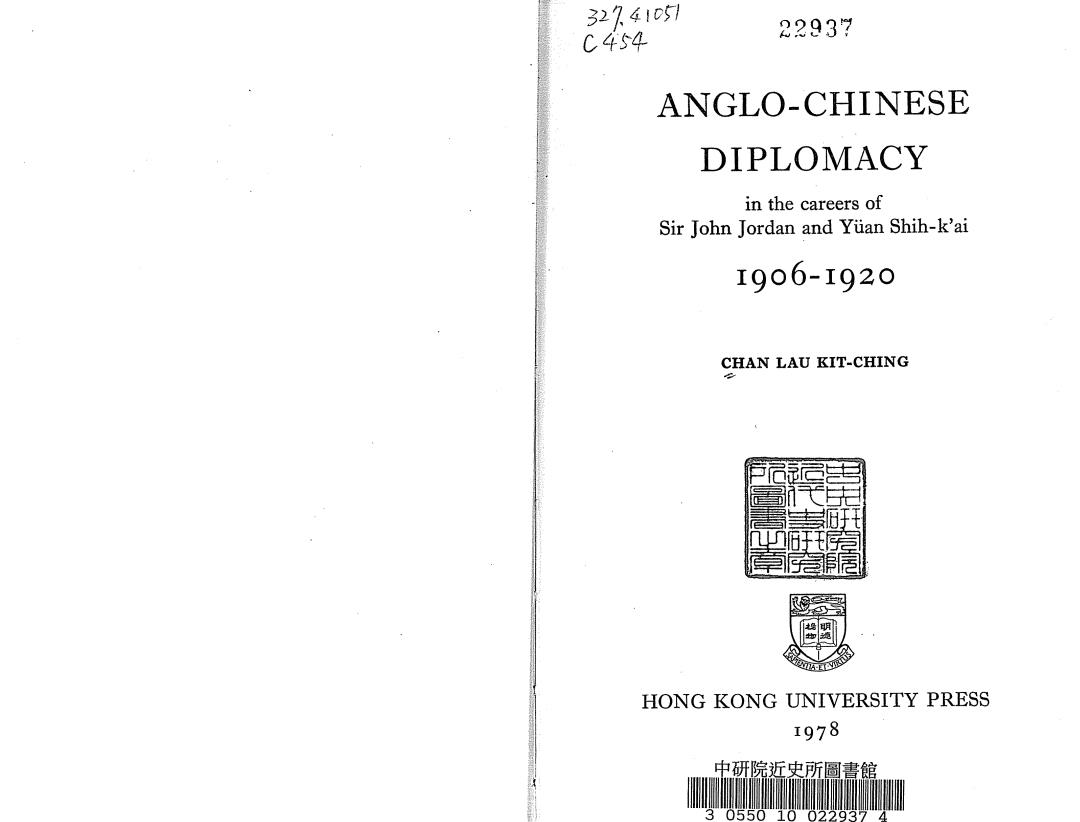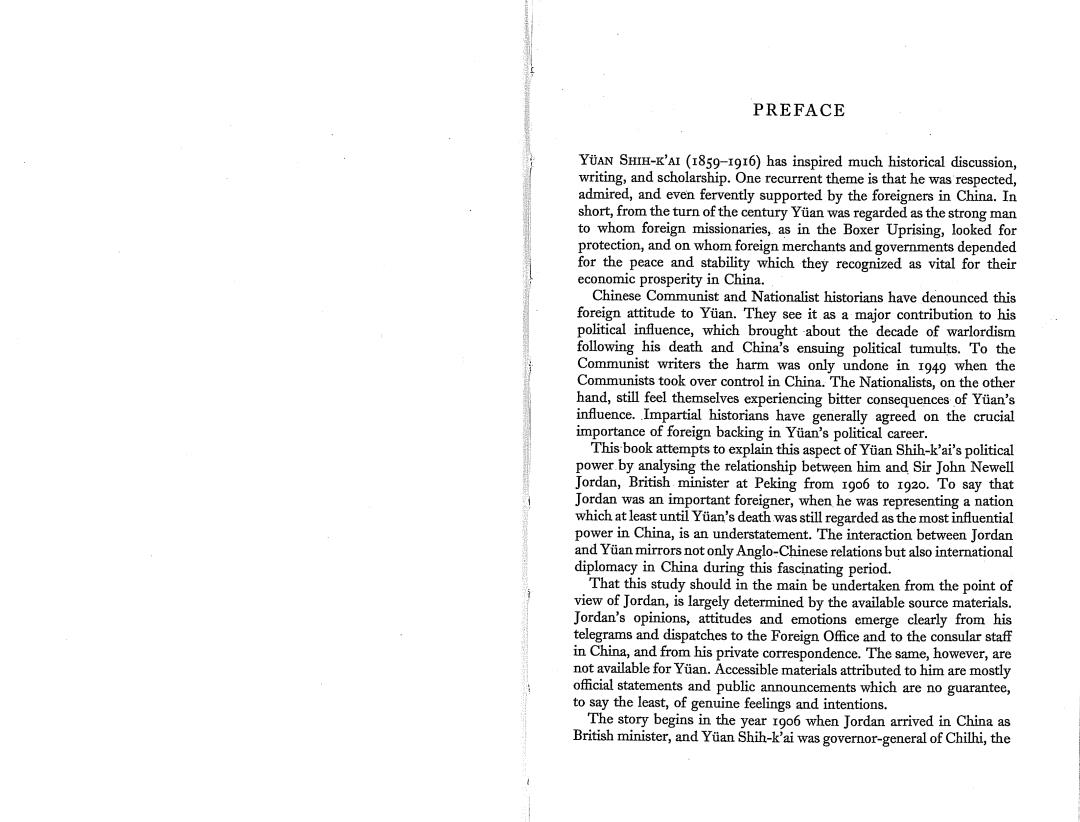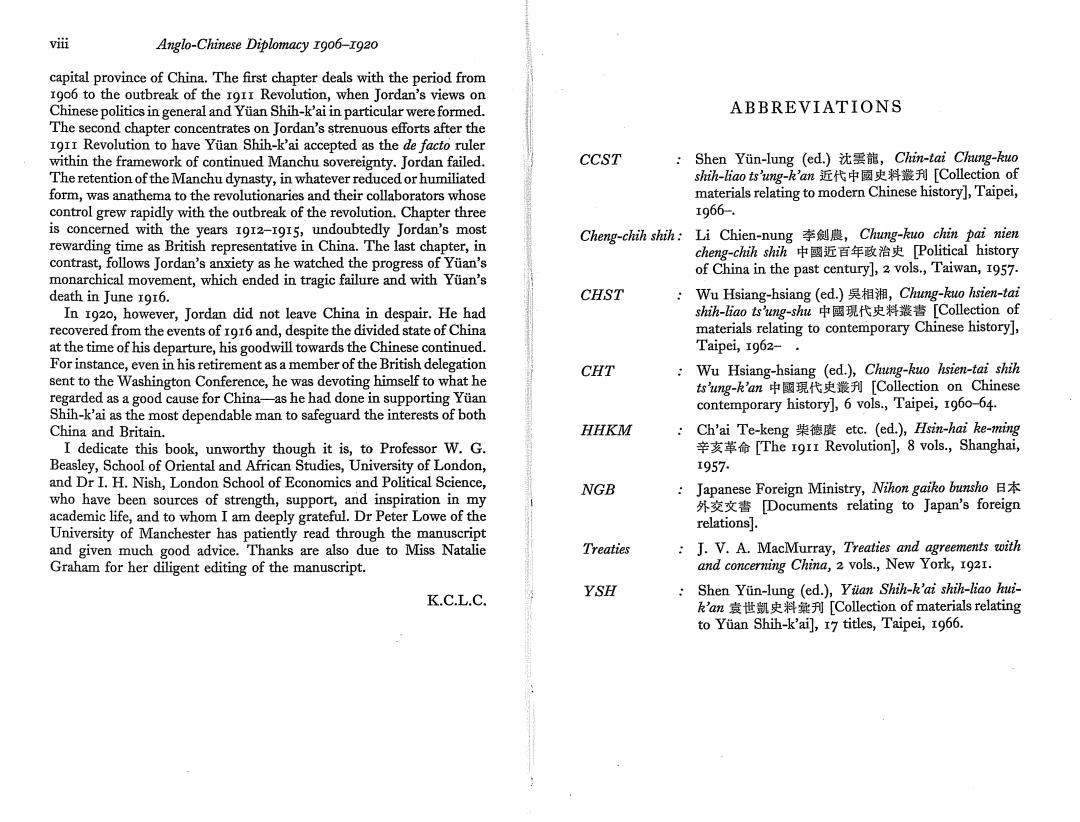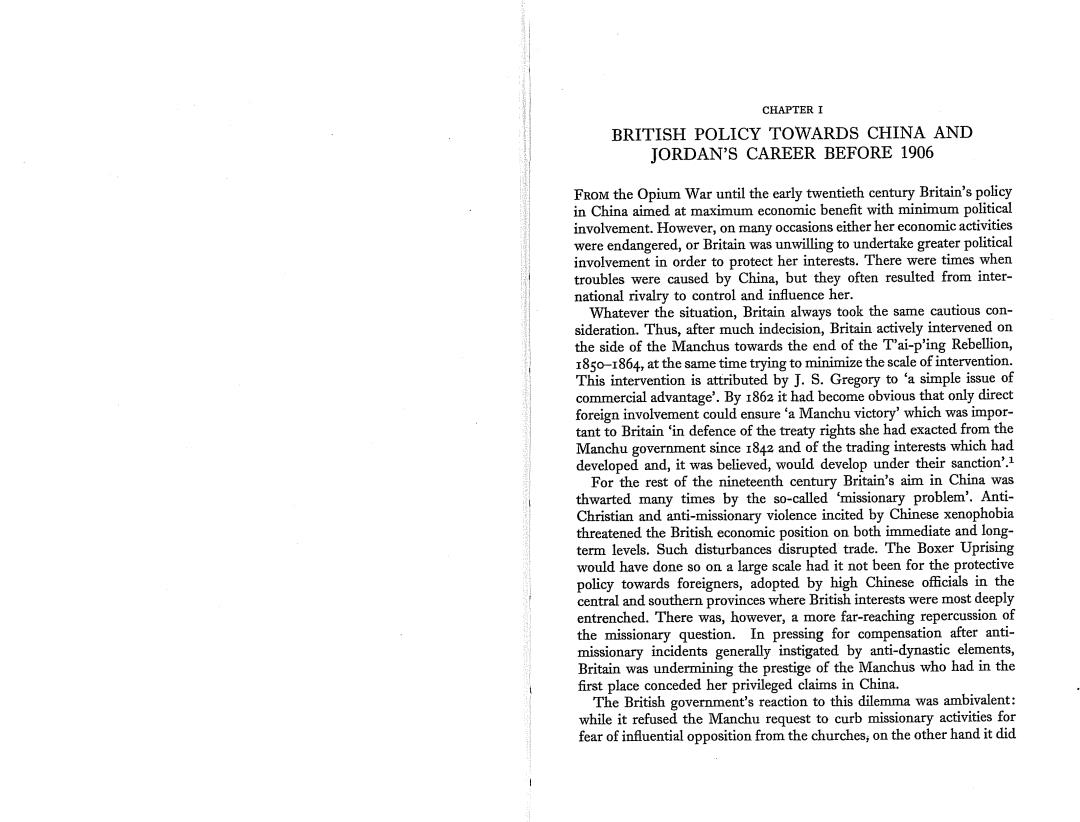
3274151 C4s4 2293? ANGLO-CHINESE DIPLOMACY in the careers of Sir John Jordan and Yuan Shih-k'ai I906-I920 CHAN LAU KIT-CHING HONG KONG UNIVERSITY PRESS I978 中研院近史所圖書館 055010 022937

C Hong Kong University Press,1978 CONTENTS ISBN962-209-oI0-9 PREFACE vii ABBREVIATIONS ix I.BRITISH POLICY TOWARDS CHINA AND JORDAN'S CAREER BEFORE I906 I II.JORDAN,YUAN AND CHINESE POLITICS,1906-191I IO III.THE I9II REVOLUTION 30 IV.YUAN's PRESIDENCY,I9I2-1915 55 V.THE MONARCHICAL MOVEMENT 76 POSTSCRIPT IOI NOTES 一 108 SELECT BIBLIOGRAPHY I44 GLOSSARY OF NAMES I57 INDEX 161 Printed in Hong Kong by LIBRA PRESS LTD. 56 Wong Chuk Hang Road 5D,Aberdeen

PREFACE YUAN SHIH-K'AI(1859-1916)has inspired much historical discussion, writing,and scholarship.One recurrent theme is that he was respected, admired,and even fervently supported by the foreigners in China.In short,from the turn of the century Yuan was regarded as the strong man to whom foreign missionaries,as in the Boxer Uprising,looked for protection,and on whom foreign merchants and governments depended for the peace and stability which they recognized as vital for their economic prosperity in China. Chinese Communist and Nationalist historians have denounced this foreign attitude to Yuan.They see it as a major contribution to his political influence,which brought about the decade of warlordism following his death and China's ensuing political tumults.To the Communist writers the harm was only undone in 1949 when the Communists took over control in China.The Nationalists,on the other hand,still feel themselves experiencing bitter consequences of Yuian's influence.Impartial historians have generally agreed on the crucial importance of foreign backing in Yuan's political career. This book attempts to explain this aspect of Yuan Shih-k'ai's political power by analysing the relationship between him and Sir John Newell Jordan,British minister at Peking from 1go6 to 1g20.To say that Jordan was an important foreigner,when he was representing a nation which at least until Yuan's death was still regarded as the most influential power in China,is an understatement.The interaction between Jordan and Yuan mirrors not only Anglo-Chinese relations but also international diplomacy in China during this fascinating period. That this study should in the main be undertaken from the point of view of Jordan,is largely determined by the available source materials. Jordan's opinions,attitudes and emotions emerge clearly from his telegrams and dispatches to the Foreign Office and to the consular staff in China,and from his private correspondence.The same,however,are not available for Yuian.Accessible materials attributed to him are mostly official statements and public announcements which are no guarantee, to say the least,of genuine feelings and intentions. The story begins in the year 1go6 when Jordan arrived in China as British minister,and Yuan Shih-k'ai was governor-general of Chilhi,the

viⅷ Anglo-Chinese Diplomacy 19o6-1920 capital province of China.The first chapter deals with the period from 19o6 to the outbreak of the igII Revolution,when Jordan's views on Chinese politics in general and Yuan Shih-k'ai in particular were formed. ABBREVIATIONS The second chapter concentrates on Jordan's strenuous efforts after the III Revolution to have Yuan Shih-k'ai accepted as the de facto ruler within the framework of continued Manchu sovereignty.Jordan failed. CCST :Shen Yun-lung(ed)沈雲前,Chin-tai Chung-kuo The retention of the Manchu dynasty,in whatever reduced or humiliated sih-liao ts'ung-k'an近代中國史料叢列[Collection of form,was anathema to the revolutionaries and their collaborators whose materials relating to modern Chinese history],Taipei, control grew rapidly with the outbreak of the revolution.Chapter three 1966-. is concerned with the years IgI2-19I5,undoubtedly Jordan's most Cheng-chih shih:Li Chien-nung李劍農,Chig-kuo chin pai nien rewarding time as British representative in China.The last chapter,in cheng--chih shih中國近百年政治史Political history contrast,follows Jordan's anxiety as he watched the progress of Yuian's monarchical movement,which ended in tragic failure and with Yuan's of China in the past century],2 vols.,Taiwan,1957. death in June 1916. CHST :Wu Hsiang-hsiang(ed)吳相湘,Chug-kuo hsien--tai In 1g20,however,Jordan did not leave China in despair.He had shih-liao ts'ung-shu中國現代史料叢書[Collection of recovered from the events of ror6 and,despite the divided state of China materials relating to contemporary Chinese history], at the time of his departure,his goodwill towards the Chinese continued. Taipei,,Ig62-· For instance,even in his retirement as a member of the British delegation CHT Wu Hsiang-hsiang (ed.),Chung-kuo hsien-tai shih sent to the Washington Conference,he was devoting himself to what he ug-h'an中國現代史叢列[Collection on Chinese regarded as a good cause for China-as he had done in supporting Yuan Shih-k'ai as the most dependable man to safeguard the interests of both contemporary history],6 vols.,Taipei,196o-64. China and Britain. HHKM Ch'aiTe-keng柴德度etc,(ed),Hsr-hai ke--mig I dedicate this book,unworthy though it is,to Professor W.G. 辛亥革命[The IgII Revolution],8vols,Shanghai, Beasley,School of Oriental and African Studies,University of London, 957. and Dr I.H.Nish,London School of Economics and Political Science, NGB Japanese Foreign Ministry,Nihon gaiko bunsho who have been sources of strength,support,and inspiration in my 外交文普Documents relating to Japan's foreign academic life,and to whom I am deeply grateful.Dr Peter Lowe of the University of Manchester has patiently read through the manuscript relations]. and given much good advice.Thanks are also due to Miss Natalie Treaties J.V.A.MacMurray,Treaties and agreements with Graham for her diligent editing of the manuscript. and concerning China,2 vols.,New York,I921. K.C.L.C. YSH Shen Yiin-lung (ed.),Yiian Shih-k'ai shih-liao hui- 'an壹世凯史料彙刊[Collection of materials relating to Yuan Shih-k'ai],I7 titles,Taipei,1966

CHAPTER I BRITISH POLICY TOWARDS CHINA AND JORDAN'S CAREER BEFORE 1906 FROM the Opium War until the early twentieth century Britain's policy in China aimed at maximum economic benefit with minimum political involvement.However,on many occasions either her economic activities were endangered,or Britain was unwilling to undertake greater political involvement in order to protect her interests.There were times when troubles were caused by China,but they often resulted from inter- national rivalry to control and influence her. Whatever the situation,Britain always took the same cautious con- sideration.Thus,after much indecision,Britain actively intervened on the side of the Manchus towards the end of the Tai-p'ing Rebellion, 1850-1864,at the same time trying to minimize the scale of intervention. This intervention is attributed by J.S.Gregory to 'a simple issue of commercial advantage'.By 1862 it had become obvious that only direct foreign involvement could ensure 'a Manchu victory'which was impor- tant to Britain in defence of the treaty rights she had exacted from the Manchu government since 1842 and of the trading interests which had developed and,it was believed,would develop under their sanction'.1 For the rest of the nineteenth century Britain's aim in China was thwarted many times by the so-called 'missionary problem'.Anti- Christian and anti-missionary violence incited by Chinese xenophobia threatened the British economic position on both immediate and long- term levels.Such disturbances disrupted trade.The Boxer Uprising would have done so on a large scale had it not been for the protective policy towards foreigners,adopted by high Chinese officials in the central and southern provinces where British interests were most deeply entrenched.There was,however,a more far-reaching repercussion of the missionary question.In pressing for compensation after anti- missionary incidents generally instigated by anti-dynastic elements, Britain was undermining the prestige of the Manchus who had in the first place conceded her privileged claims in China. The British government's reaction to this dilemma was ambivalent: while it refused the Manchu request to curb missionary activities for fear of infuential opposition from the churches;on the other hand it did